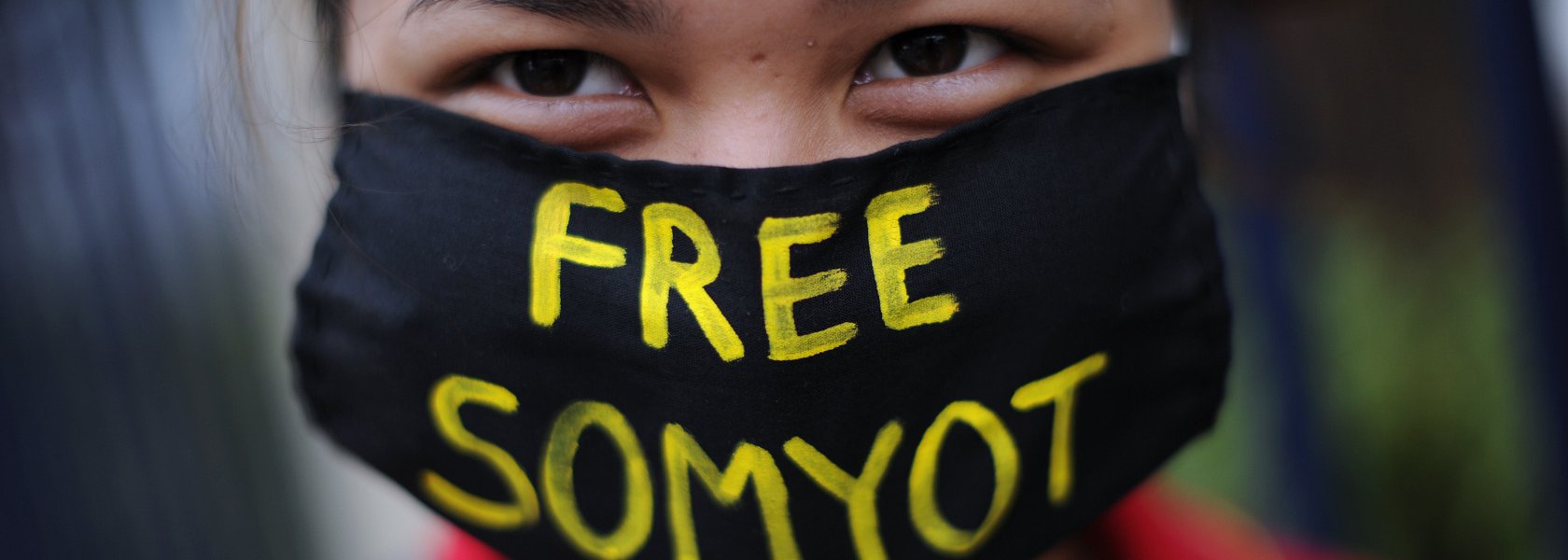Free Somyot, arbitrarily detained for 2,000 days
Paris-Geneva, October 20, 2016: Thai authorities mustimmediately and unconditionally release human rights defender SomyotPhrueksakasemsuk, the Observatory for the Protection of Human Rights Defenders(an FIDH-OMCT partnership) reiterated today.

“Somyot’s arbitrary deprivation of liberty is inblatant contravention of Thailand’s obligations under international law. It’stime to end Somyot’s unfair persecution and immediately return him to hisfamily”, said FIDH PresidentDimitris Christopoulos.
Having spent 2,000 days behind bars, Somyot, 55, iscurrently the longest-serving lèse-majesté detainee. Somyot remainsincarcerated in Bangkok Remand Prison, where he is serving a 10-year sentencefollowing his conviction on charges of lèse-majesté under Article 112 ofThailand’s Criminal Code. Article 112 states that “whoever defames, insults orthreatens the King, the Queen, the Heir to the throne or the Regent shall be punishedwith imprisonment of three to 15 years.” Somyot is also serving an additionalyear in prison as a result of an earlier sentence for defamation in connectionwith another case.
“Somyot has been detained for more than five yearsonly for exercising his legitimate right to freedom of expression. Thaiauthorities should free him immediately and stop using restrictive legislation,including Article 112, that is inconsistent with international human rightsstandards”, said OMCT SecretaryGeneral Gerald Staberock.
The Observatory condemns the flaws and delays in thejudicial proceedings against Somyot, and the courts’ repeated refusals to granthim bail. Somyot unsuccessfully petitioned for bail 16 times – the last timebeing in November 2014 - and has been waiting 700 days for a Supreme Courthearing.
Several UN human rights monitoring bodies have voicedconcern over Somyot’s deprivation of liberty. In an opinion issued on August30, 2012, the UN Working Group on Arbitrary Detention (WGAD) affirmed thatSomyot’s detention was arbitrary, and called on Thai authorities to releaseSomyot and award him adequate compensation.
Background information
A former labour rights activist and magazine editor,Somyot was arrested on April 30, 2011, five days after he launched a petitioncampaign to collect 10,000 signatures required for a parliamentary review ofArticle 112. On January 23, 2013, the Bangkok Criminal Court sentenced him to10 years in prison on two counts of lèse-majesté. Somyot was convicted forallowing the publication of two satirical articles in the now-defunct magazine Voice of Taksin, of which he was theeditor. The articles were authored by someone else and deemed by the Thaiauthorities to have insulted the late King Bhumibol Adulyadej.
On September 19, 2014, the Court of Appeals upheld theBangkok Criminal Court’s lèse-majesté conviction of Somyot. The Court ofAppeals failed to notify Somyot, his lawyer, and his family members that thehearing would take place on that day. On September 23, 2014, the UN Office ofthe High Commissioner for Human Rights (OHCHR) voiced its disappointment overthe Court of Appeals’ ruling that upheld Somyot’s conviction. On November 19,2014, Somyot filed an appeal to the Supreme Court against his conviction.
Somyot’s conviction and his detention do not complywith Thailand’s international legal obligations. Article 19 of theInternational Covenant on Civil and Political Rights (ICCPR), to which Thailandis a state party, provides that everyone has the right to freedom ofexpression. This right includes the “freedom to seek, receive, and impartinformation and ideas of all kinds.”
In its General Comment on Article 19, the UN Human RightsCommittee (CCPR), the body that monitors state parties’ compliance with theprovisions of the ICCPR, affirmed that, “all public figures, including thoseexercising the highest political authority such as heads of state andgovernment, are legitimately subject to criticism and political opposition.”The CCPR specifically expressed concern regarding lèse-majesté laws and statedthat “imprisonment is never an appropriate penalty” for defamation.
On August 11, 2015, OHCHR urgedThailand to amend the “vague and broad” lèse-majesté law to bring it in linewith international human rights standards. OHCHR also called for the immediaterelease of all those who had been jailed for the exercise of their right tofreedom of expression.
The Observatory for the Protection of Human RightsDefenders (the Observatory) was created in 1997 by the World OrganisationAgainst Torture (OMCT) and FIDH. The objective of this programme is tointervene to prevent or remedy situations of repression against human rightsdefenders. OMCT and FIDH are both members of ProtectDefenders.eu, theEuropean Union Human Rights Defenders Mechanism implemented by internationalcivil society.
Tags
Related resources
-
- Thailand
- 22.09.14
- Urgent Interventions
Read moreSentencing in appeal of Mr. Somyot Phueksakasemsuk
-
- Thailand
- 23.01.15
- Urgent Interventions
Read morePress Release: Somyot Phrueksakasemsuk must be released on bail
-
- Thailand
- 29.04.16
- Urgent Interventions
Read moreFive years on, international organizations renew their call for the release of Somyot Phrueksakasemsuk